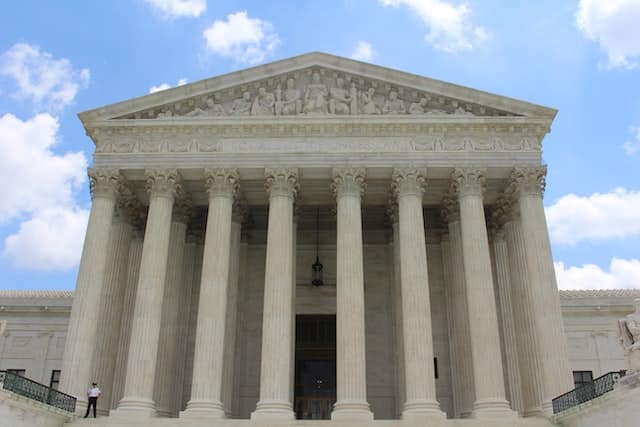The U.S. Supreme Court gaveled in and wasted no time getting down to business on Monday, the first day of its 2022-’23 term.
Court Adds Several New Cases to its Docket
Along with the cases the Supreme Court had already agreed to hear this term the Justices added several more on Day One.
The first was a case to revive a lawsuit against Google-owned YouTube, which is accused of aiding the 2015 Paris terror attacks. In taking up Gonzalez v Google, the Court agreed to reconsider the broad legal immunity afforded to internet companies under the Communications Decency Act.
Soon after, the Court said it would hear an appeal by the territory of Puerto Rico against a lawsuit by a group of journalists seeking access to its financial records, taking up Financial Oversight Board v Centro de Periodismo Investigativo. The appeal comes after a First Circuit ruling that says Puerto Rico does not have sovereign immunity shielding it from having to provide those records.
The Court also took up a case of Ohio Adjutant General’s Department v Federal Labor Relations Authority , over whether state militias can be forced, via the Civil Service Reform Act of 1978, to bargain with labor unions.
They weren’t finished. Other cases they agreed to hear included:
- Turkiye Halk Banks v United States, whether criminal charges can go forward against a Turkish bank owned and controlled by the Turkish government
- Perez v Sturgis Public Schools, where a deaf student is suing his school district for allegedly failing to provide him with a qualified sign language interpreter
- Santos-Zacharia v Garland, over whether the Board of Immigration Appeals had engaged in impermissible factfinding
- Glacier Northwest v International Brotherhood of Teamsters, over whether federal labor laws override a state lawsuit against a union for destroying an employer’s property during a labor dispute.
Redistricting, Bump Stocks, Vaccine Cases Rejected
But the Supreme Court declined to hear numerous cases, including a challenge to Pennsylvania’s congressional district map, rejecting an appeal from a former Republican lawmaker.
Nor will the Court review a lawsuit seeking to overturn a 10th Circuit court’s decision banning bump stocks under the National Firearms Act.
The Court also refused to hear a challenge to the Biden Administration’s Covid-19 vaccine mandate for workers at businesses that receive federal health-care funds.
Oral Arguments in Two Cases
The Court also heard arguments in two cases on Monday. Delaware v Pennsylvania and Wisconsin will decide custody of hundreds of millions of dollars in unclaimed MoneyGram funds.
The other could potentially limit the Clean Water Act. Sackett v The Environmental Protection Agency centers on the argument that the 1972 Act, which prohibits the “discharge of pollutants [into] navigable waters” defines “navigable waters” too vaguely—having to do with all “waters of the United States, including the territorial seas.”
New Justice Not Sitting Back
The newest Justice on the Supreme Court, Ketanji Brown Jackson, did not take her freshman status nor her position as one of only three liberals on a 6-3 conservative supermajority as a directive to sit back and observe on Day One.
Seated at the far right next to conservative Justice Brett Kavanagh, Court observers say the first Black woman Justice asked more than 20 probing questions and pointed follow-ups, appearing to demand clarity from the attorneys arguing those two cases brought before the Court Monday.


